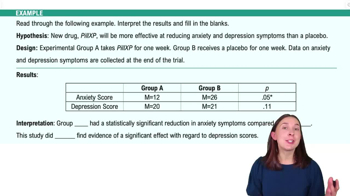Table of contents
- 1. Introduction to Psychology1h 43m
- 2. Psychology Research2h 20m
- 3. Biological Psychology2h 41m
- 4. Sensation and Perception28m
- 5. Consciousness and Sleep32m
- 6. Learning41m
- 7. Memory34m
- 8. Cognition37m
- 9. Emotion and Motivation35m
- 10. Developmental Psychology33m
- 11. Personality48m
- 12. Social Psychology41m
- 13. Stress and Health41m
- 14. Psychological Disorders44m
- 15. Treatment47m
2. Psychology Research
Evaluating Research Findings
Struggling with Psychology?
Join thousands of students who trust us to help them ace their exams!Watch the first videoMultiple Choice
A criticism of Abraham Maslow's hierarchy is that it was developed based on residents of the United States. Compared to the others, in which country's culture would security needs be much stronger than self-actualization needs?
A
Norway
B
Japan
C
Sweden
D
Switzerland
 Verified step by step guidance
Verified step by step guidance1
Understand Maslow's hierarchy of needs, which is a psychological theory proposing that human needs are arranged in a hierarchy, starting from basic physiological needs to self-actualization.
Recognize that Maslow's hierarchy was developed based on Western cultural values, particularly those prevalent in the United States, which may not universally apply to all cultures.
Consider the cultural context of each country listed. In some cultures, collective security and social harmony may be prioritized over individual self-actualization.
Analyze Japan's cultural values, which emphasize group harmony, social stability, and security, often placing these needs above individual pursuits of self-actualization.
Compare this with the cultural values of Norway, Sweden, and Switzerland, which may have different emphases on individualism and self-actualization, potentially aligning more closely with Maslow's original hierarchy.

 6:00m
6:00mWatch next
Master Descriptive Statistics – Measures of Central Tendency with a bite sized video explanation from Hannah Gordils
Start learningRelated Videos
Related Practice















![Ethical Guidelines in Psychology [AP Psychology Unit 1 Topic 6] (1.6)](https://img.youtube.com/vi/ilq2nGO7_QA/mqdefault.jpg)





























